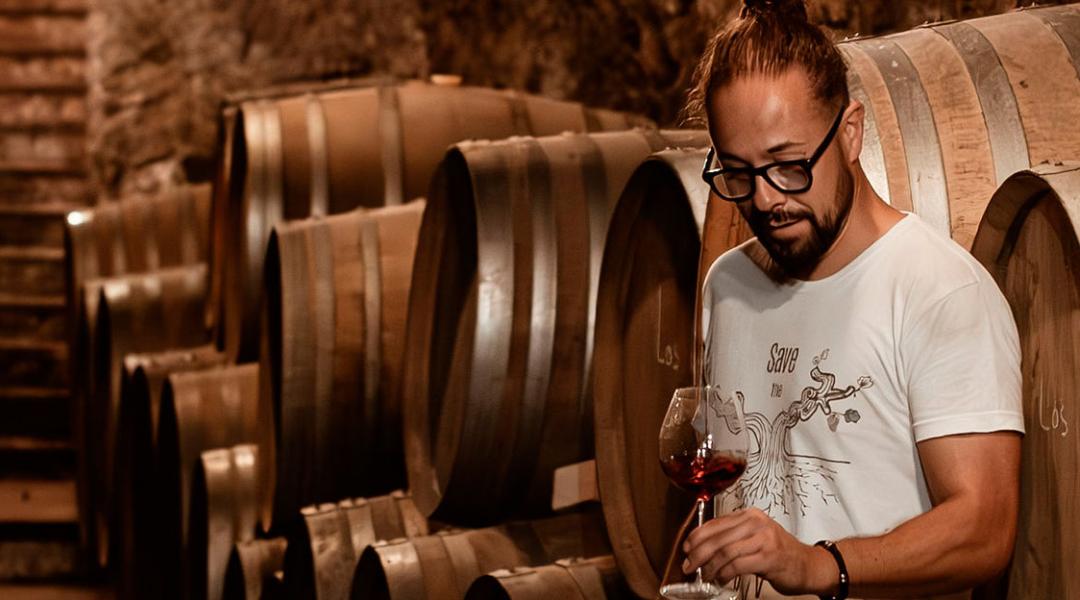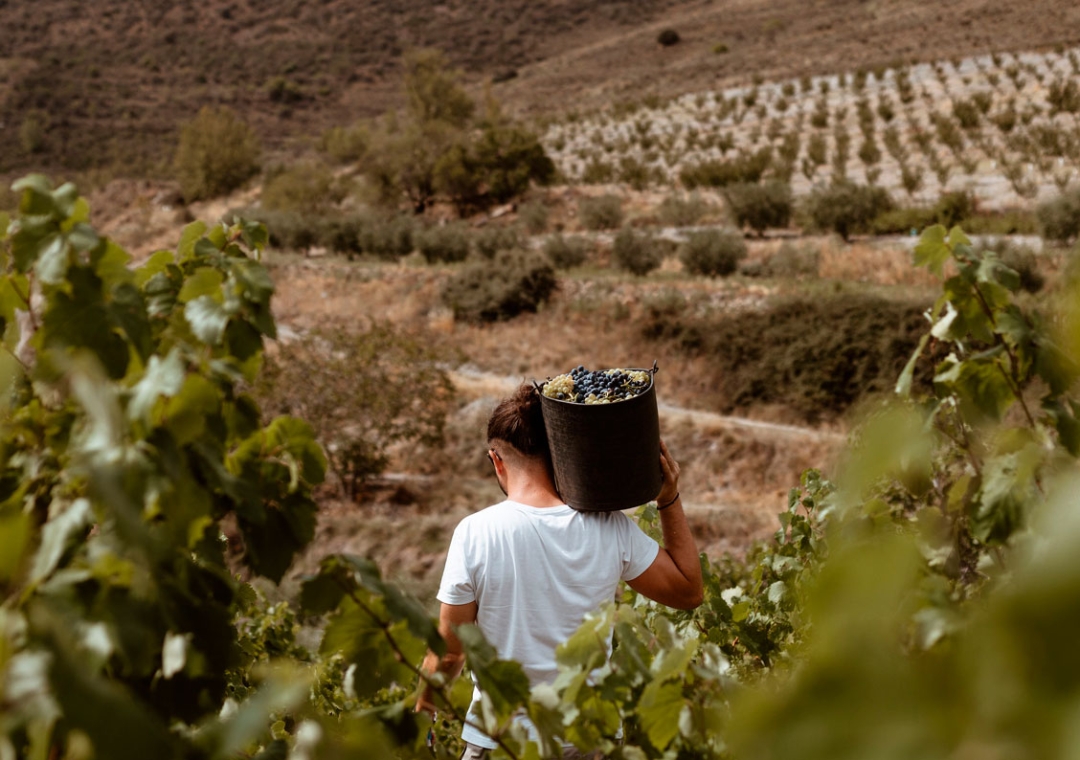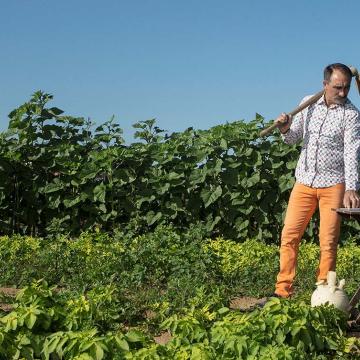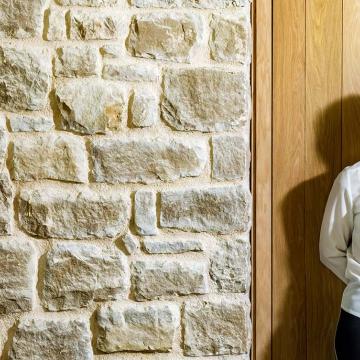Since opening on the 17th of April, Espacio Iberia has welcomed dozens of guests with one thing in common: their infinite talent. Talent that has inspired all the people who have sat there to listen to them.

“Wine stirs passions that go beyond reason.” Fernando Mora, who left his engineering job 15 years ago to become a wine grower and is one of the few Spanish Masters of Wine (MW) today, knows this well. At the next edition of Madrid Fusión, he will offer a series of tastings in collaboration with Iberia, a unique opportunity to learn alongside one of the greatest wine experts in the world.
“Nobody gets together to eat apples and comment on them, which we do with wine. I wonder why?” Is there anyone better to do this with than a Master of Wine (MW), the greatest honour in the wine world, like Fernando Mora (Zaragoza, 1982)? This wine grower is one of a handful of Spaniards granted this title and, in collaboration with Iberia, he will offer three tastings for ten people at the next edition of Madrid Fusión (29th to 31st of January). “On an Iberia flight, people from around the world drink up sips of Spain thousands of feet up in the air. That’s wonderful!” Fernando assures us with contagious passion. This event will take place at the company’s stand, where the MW will present the five Spaniards wines available at Iberia’s Premium Lounges and explain the importance of wine pairings in gastronomy, as well as a series of tips to choose the right wine.
This wind engineer’s relationship with wine started 15 years ago, after a wine tourism trip changed his life, but we have a feeling he was made for this. “Since I was little, I’ve loved smelling things, my father used to say I was rude for smelling everything. ‘Good job you didn’t take any notice of me, son’, he told me when I was awarded the MW title,” Fernando laughs. The head of Bodegas Frontonio, this advocate of the Grenache variety has devoted himself to preserving the old vineyards of Aragón, preventing the land from remaining barren and reinvigorating villages like Alpartir (located in the region of Valdejalón, Zaragoza), where he lives and works. “If you have a great wine, you need to tell people so that they understand it’s not only a liquid, it’s the artistic expression of a region concentrated in a bottle,” he claims.
“A wine it’s not only a liquid, it’s the artistic expression of a region concentrated in a bottle”
From one day to the next, you decided to leave your career as an engineer to devote yourself to the world of wine. What pushed you to turn your life around like this?
There were several reasons. I used to travel a lot for work and my boss enjoyed trying out regional wines. I discovered the diversity of this world, and it opened my mind. I was also impressed by a wine tourism trip to a wine museum in Briones (La Rioja). I learnt the history of wine, a drink that is so special it has inspired paintings, sculptures, songs... The technical side also caught my attention, because making wine is really difficult. The tasting course I took there was a revelation. I left that museum convinced that I wanted to make wine.
Then, you trained and founded your own cellar in Aragón, your homeland. Are you proud that your wines reflect your place of origin?
The most beautiful thing about a wine is for it to reflect the place it comes from. Aragón is my homeland and where I decided to produce my wine. Mostly a single variety, Grenache, is planted here, which can produce really rich and diverse wines, and I believed that it could be used to reflect the land in a different way, making lighter and fresher wines. For several years, I looked for vineyards that reflected that other side of Aragón. At the beginning, few joined the cause, but we’ve slowly managed to bring many closer to the vineyards of our land.
“The most beautiful thing about a wine is for it to reflect the place it comes from. Aragón is my homeland and where I decided to produce my wine”
Now your wines are on the menus of Michelin-star restaurants. Did you dream of something like this when you started to make wine in your flat?
Of course not. We started making wine in an apartment and then moved onto a garage. When we finished our first bottling, we weren’t sure what to call it or how much to charge for it, or even if it was really good! I tasted my wines and considered they didn’t cut the mustard. This is why, at the same time, I started travelling and interning at other cellars, to learn and improve my own. We started making wine with some old vineyards in Aragón which were destined to disappear and now our bottles are at some of the best restaurants in the world, that’s lovely.

Fernando Mora lives and works in Alpartir (Zaragoza), next to the vineyards he extracts his wine from. © Lidia Mostajo
You know most winegrowing areas in the world. If you had to change Aragón for another place to make wine, where would you fly to?
I wouldn’t change Aragón for anywhere in the world. But if I had to choose, I’d fly to Burgundy (France). Another area I love is El Priorat (Tarragona, Spain). I’d also like to make wine in Barolo, a village in the Italian region of Piedmont. My favourite varieties are thin-skinned grapes —pinot noir, Nebbiolo and Grenache— because they have the capacity to convey the place they’re from. They also require greater precision to make good wine and I’m attracted to that complexity.
In 2017, you became one of the few MW there are in the world. What did achieving that title mean to you?
I set very high standards for myself, and I struggle to see that I’m doing a good job so, above all, it was recognition. It was also a challenge. Less than 13-14% of those who start this course finish it and graduating takes an average of six years. I passed on my first try, after studying for 2 years and 9 months. During that time, I tasted thousands of wines, I learnt a lot about wine growing and discovered many winegrowing areas. I also made a network of contacts that has allowed me to share my wines around the world. The qualification gives you credibility and opens many doors, but then you need to prove you have something to say. My wines are better since I’m a MW. My 2018 vintage was my first great one because I applied all that knowledge and that’s when I realised that my hobby had turned into my profession.
“The most important thing is the grape. A great wine can only come from great vineyards, which produce fruit with unique characteristics”
For a MW like you, where does the secret of a great wine lie?
The first and most important thing is the grape. A great wine can only come from great vineyards, which produce fruit with unique characteristics. The person in charge of interpreting and cultivating that vineyard properly is also key. The second is for the wine to be so unique that people perceive that they are tasting something special. The third is having good communication, explaining it to people and presenting it to sommeliers, collectors, and journalists from around the world. From an organoleptic perspective [what can be perceived by the sensory organs], the most important aspect of a wine is its texture: how it behaves in the mouth, its length, balance, complexity, and concentration. And one more thing: great wines have the capacity to improve over time.
Talent is indispensable to make good wine. In this sense, how much wine-making talent is there in Spain?
So much. We have the perfect climate to cultivate grapes, some of the best vineyards in the world and an incredible winegrowing tradition with unique techniques. You just need to go to La Geria (Lanzarote) to see how it’s cultivated under ash. But all that would be useless without the talent of wine-making professionals. The role of sommeliers, who explain what’s behind each bottle, is also essential. And I don’t want to forget those who sell our wines abroad. Spain is undergoing a winegrowing revolution, special vineyards are being recovered to make unique wines and, if we manage to get people to be willing to pay a bit more for each bottle, we’ll get the wine grower, who’s talent is also key, to earn more per kilo of grapes. This is important because, without wine growers, the vineyards disappear.


